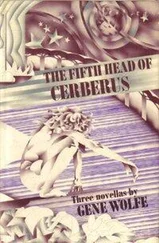As I leaped away from the mace for perhaps the hundredth time, something struck my heel and I nearly fell. It was the lowest step of a flight that climbed the wall. I went up, gaining a bit of advantage from the height but not enough to let me halt my retreat. There was a narrow walkway along the top of the wall. I was driven backward along it step by step. Now indeed I would have turned to run if I had dared, but I recalled how quickly the giant had moved when I surprised him in the chamber of clouds, and I knew that he would be upon me in a leap, just as I had, as a boy, overtaken the rats in the oubliette below our tower, breaking their spines with a stick.
But not every circumstance favored Baldanders. Something white flashed between us, then there was a bone-tipped spear thrust into one huge arm, like an ylespil’s quill in the neck of a bull. The lake men were now far enough from the singing mace that the terror it waked no longer prevented them from throwing their weapons. Baldanders hesitated for a moment, stepping back to pull the spear out. Another struck him, grazing his face.
Then I knew hope and leaped forward, and in leaping lost my footing on a broken, rain-slick stone. I nearly went over the edge, but at the last instant caught hold of the parapet — in time to see the luminous head of the giant’s mace descending. Instinctively I raised Terminus Est to ward off the blow.
There was such a scream as might have been made if all the specters of all the men and women she had slain were gathered on the wall — then a deafening explosion.
I lay stunned for a moment. But Baldanders was stunned as well, and the lake men, with the spell of the mace broken, were swarming along the walkway toward him from either side. Perhaps the steel of her blade, which had its own natural frequency and, as I had often observed, chimed with miraculous sweetness if tapped with a finger, was too much for whatever mechanism lent its strange powers to the giant’s mace. Perhaps it was only that her edge, sharper than a surgeon’s knife and as hard as obsidian, had penetrated the macehead. Whatever had occurred, the mace was gone, and I held in my hands only the sword’s hilt, from which protruded less than a cubit of shattered metal. The hydrargyrum that had labored so long in the darkness there ran from it now in silver tears.
Before I could rise, the lake men were springing over me. A spear plunged into the giant’s chest, and a thrown club struck him in the face. At a sweep of his arm, two of the lake warriors tumbled screaming from the wall. Others were upon him at once, but he shook them off. I struggled to my feet, still only half comprehending what had taken place.
For an instant, Baldanders stood poised upon the parapet; then he leaped. No doubt he received great aid from the belt he wore, but the strength of his legs must have been enormous. Slowly, heavily, he arched out and out, down and down. Three who had clung to him too long fell to their deaths on the rocks of the promontory.
At last he fell too, hugely, as if he were — alone and in himself — some species of flying ship out of control. White as milk, the lake erupted, then closed over him. Something that writhed like a serpent and sometimes caught the light rose from the water and into the sky, until at last it vanished among the sullen clouds; no doubt it was the belt. But though the islanders stood with spears poised, his head never showed above the waves.
THAT NIGHT THE lake men ransacked the castle; I did not join them, nor did I sleep inside its walls. In the center of the grove of pines where we had held our council, I found a spot so sheltered by the boughs that its carpet of fallen needles was still dry. There, when my wounds had been washed and bandaged, I lay down. The hilt of the sword that had been mine, and Master Palaemon’s before me, lay beside me, so that I felt I slept with a dead thing; but it brought me no dreams.
I woke with the fragrance of the pines in my nostrils. Urth had turned almost her full face to the sun. My body was sore, and the cuts I had received from the flying shards of stone smarted and burned, but it was the warmest day I had experienced since I had left Thrax and mounted into the high lands. I walked out of the grove and saw Lake Diuturna sparkling in the sun and fresh grass growing between the stones.
I sat down on a projecting rock, with the wall of Baldander’s castle rising behind me and the blue lake spread at my feet, and for the last time removed the tang of the ruined blade that had been Terminus Est from the lovely hilt of silver and onyx. It is the blade that is the sword, and Terminus Est is no more; but I carried that hilt with me for the rest of my journey, though I burned the manskin sheath. The hilt will hold another blade someday, even if it cannot be as perfect and will not be mine.
What remained of my blade I kissed and cast into the water.
Then I began my search among the rocks. I had only a vague idea of the direction in which Baldanders had hurled the Claw, but I knew his throw had been toward the lake, and though I had seen the gem clear the top of the wall, I felt that even such an arm as his might have failed to send so small an object far from shore.
I soon found, however, that if it had gone into the lake at all, it was lost utterly, for the water was many ells deep everywhere. Yet it still seemed possible that it had not reached the lake and was lodged in a crevice where its radiance was invisible.
And so I searched, afraid to ask the lake men to assist me, and afraid also to give up the search to rest or eat for fear someone else would take it up. Night came, and the cry of the loon at the dying of the light, and the lake men offered to take me to their islands, but I refused. They feared that shore people would come, or that they were already organizing an attack that would revenge Baldanders (I did not dare to tell them that I suspected he was not dead, but remained alive beneath the waters of the lake), and so at last, at my urging they left me alone, still crawling among the sharp-cornered rocks of the promontory.
Eventually I grew too weary to hunt more in the dark and settled myself upon a shelving slab to wait for day. From time to time it seemed that I saw azure gleaming from some crack near where I lay or from the waters below; but always when I stretched out my hand to grasp it or tried to stand to walk to the edge of the slab to look down at it, I woke with a start and found I had been dreaming.
A hundred times I wondered if someone else had not found the gem while I slept under the/pine, which I cursed myself for doing. A hundred times, also, I reminded myself how much better it would be for it to be found by anyone than for it to be lost forever.
Just as summer-killed meat draws flies, so the court draws spurious sages, philosophists, and acosmists who remain there as long as their purses and their wits will maintain them, in the hope (at first) of an appointment from the Autarch and (later) of obtaining a tutorial position in some exalted family. At sixteen or so, Thecla was attracted, as I think young women often are, to their lectures on theogony, thodicy, and the like, and I recall one particularly in which a phoebad put forward as an ultimate truth the ancient sophistry of the existence of three Adonai, that of the city (or of the people), that of the poets, and that of the philosophers. Her reasoning was that since the beginning of human consciousness (if such a beginning ever was) there have been vast numbers of persons in the three categories who have endeavored to pierce the secret of the divine. If it does not exist, they should have discovered that long before; if it does, it is not possible that Truth itself should mislead them. Yet the beliefs of the populace, the insights of the rhapsodists, and the theories of the metaphysicians have so far diverged that few of them can so much as comprehend what the others say, and someone who knew nothing of any of their ideas might well believe there was no connection at all between them.
Читать дальше










